(Dis)Ability in the Work of an Australian Filmmaker
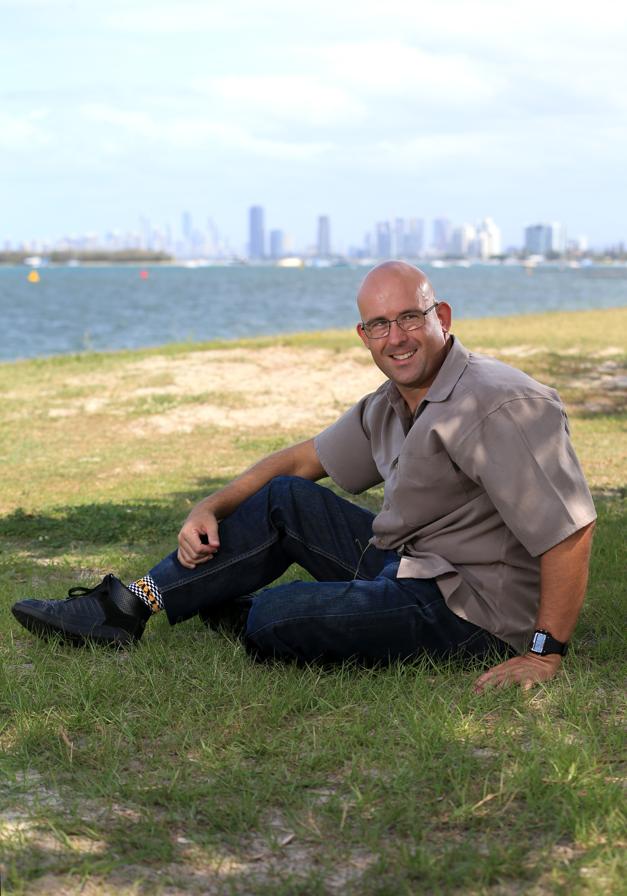
Australian Filmmaker gough Speaks to The Independent About How Blindness Has Shaped His Career and Creativity
The Independent’s editor sat down with Australian filmmaker gough (who prefers this single-name, lowercase moniker) to discuss his successful production company and multiple projects. gough, who is legally blind, is an advocate for disabled people and also a witness of our need to rethink traditional conceptions of able-bodiedness.
There is so much we need to get to, and of course our readers will want to learn how you work around your blindness in writing, directing, and producing films. But, first, can you tells us about your company, Beernuts Productions? How did this come about, and what kinds of projects do you take on?
Sure! And thank you for this chance to speak about Beernuts Productions. We are a fully independent production company based in Australia. We fund, produce, and distribute all of our own work directly through the website www.beernutsproductions.com.
When I first approached film producers, TV executives and the like about producing my scripts, none of them were interested; they couldn’t understand how a blind guy could do this kind of work.I think it’s very sad that people were unable to take my talent and work seriously, based purely on my disability. I felt that showed a lot of ignorance on their part. I thought, somewhat naively, that starting my own production company would resolve this.
However the negative stereotypes that people have in regards to disability did not go away. I continue to face obstacles put upon me by the limited thinking of others. Still, having my own company does allow me to go it alone and produce work myself.
Would you say there is a lesson here for other people (those without your specific challenges) who are having trouble getting attention from production companies or people in the industry?
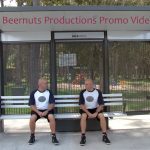
Yes. People have said that I make it sound so simple. But I think it is simple; people in the film industry tend to over complicate things. If external production houses and producers won’t assist in getting films off the ground, then writers and creators need to find ways to do it themselves. It would have been a tragedy had I let all my hard work—all those scripts, which I think are hilarious and give people a lot of joy— go to waste.
Since Beernuts Productions was founded back in November of 2006, we have gone on to make 13 films (one feature length documentary and 12 shorts), 7 audio downloads, and 4 books. Most of the content is comedy based since that is definitely my favorite genre. There is no better feeling than making someone laugh, even if only for a short while.
So, you found ways around the obstacles others place on your blindness. But, clearly your disability has impacted, perhaps enhanced, your artistic ability. Can you speak about how blindness shapes your process as a filmmaker?
That’s right, I am legally blind and the first blind person in the world to write, produce, edit, direct and star in a feature film. I had a hemorrhagic stroke when I was an infant which caused me to loose most of my eye sight. I have no clear vision in my right eye and very limited vision in my left. Therefore in Australia I am classified as being legally blind.
I think that being legally blind has advantages with writing and directing. Because I can’t see things like facial expressions, I’m not distracted by the small things and can focus on the delivery of my lines. At the end of the day, if a line of dialogue isn’t delivered by an actor just right, the joke won’t be funny or the emotional moment won’t be captured. I also think it helps me with my writing in that I have spent a lifetime really listening to people because I cannot read body language or facial expression. In doing so, you can really pick up on funny ways people say things and the way the tone or inflection of someone’s voice can change the meaning of an entire sentence. Consequently, most of my scripts are dialogue based; that is where my comedy and drama comes from. This is quite like how it feels to inhabit my life, and it makes my work unique.
When you are blind, organization is key. I’m not just referring to work, but in life generally. For example, I can’t just jump in the car and drive down to the shops if I forget to pick up some milk or bread. I have to make sure I’m well organized in all aspects of my life and so this carries through to my work. And in film, I think being well organized is a must. Knowing how long a shot will take to film, making sure people aren’t waiting around. I don’t like keeping actors waiting as they can easily become bored or distracted. I like to keep them as fresh as possible so you get a better performance out of them. Making sure the crew knows exactly what they are doing and how you want them to do it. And all of this comes down to good organization and meticulous preparation.
A major misconception about film is that it’s all visual. Just because you sit and you watch a screen does not mean your other senses are not being utilized. For example, what gives you the creeps in a great horror film is very rarely what you see; it’s what you don’t see. It’s the sound of creaking timber, a knife scraping along glass. It’s the music used and the feeling the film gives you. A great comedy film has witty dialogue that leaves you gasping for breath and a musical is just that, all about the music, something that gets your foot tapping. So I think it is wrong to assume that a film is all about the visual because there is so much more too it. A great film vividly excites all your senses.
Agreed! And perhaps some of this awareness comes from the nurturing you received as an artist. I am told you come from a creative family. Can you speak about the influences that shaped you as a young filmmaker, writer, and director?
Yes, I’ve been involved in the entertainment industry pretty much from day one. My father, Dave Gray, is a well-known comedian here in Australia and that is probably where my love of comedy comes from. There is no doubt I’m a comedy nerd and film nerd. As a youngster while other kids were out riding their bikes and climbing trees, I was busy listening to old recordings of British comedians or watching Monty Python sketches. There were a group of Australian comedians in the early 90’s called The D-Generation who I loved watching and learned a lot from. They clearly had no money to make their TV shows etc. but it never stopped them being as creative as they wanted and producing hilarious work.
So as a kid I started writing little sketches and books and scripts. When I got a bit older (in my late teens) I sent some of my work to a script writer friend of my father’s and he was extremely generous in his guidance. He was also brutally honest, which I think helped me a lot as well. He wasn’t afraid to tell me when something was no good.
As far as influences in film go, I’m always drawn to really well crafted scripts, whether it be brilliantly funny dialogue or something that is a bit out of the ordinary, not necessarily quirky (though there is nothing wrong with that) but more or less a storyline that has good twists and turns to it. The last thing you ever want to be, as a writer, is predictable or boring. As my script writing mentor Hugh Stucky says, “once you lose the audience, you never get them back.”
Generally speaking, what is your approach to working with cast and crew?
Being legally blind does mean I have to have a crew around me who I can trust. So if I want a certain shot, I know that my cinematographer will do this and not just go off on his own tangent. I do have very limited sight, so in the editing booth I am able to confirm we’ve captured what I’m after, but by then it is too late to change anything as the footage has already been shot and we don’t have the budget to reshoot. So making sure I have a supportive crew who share my vision is vital.
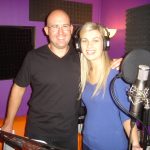
The same goes for the actors. I can’t see facial expressions. So I need to trust that they are giving me the emotion and facial expressions I am after. This comes down to me being able to communicate to them what the character is feeling and making sure they understand what it is I want. I do have a sighted guide on set who does tell me that yes the actors are giving me the facial expressions I’m after and that the scene looks good and we are good to move on. But making sure you have a cast and crew you can trust and work with is key.
Being a football fan, I think of it a lot in terms of the game: I’m the coach and they’re my players. So as a coach, I need to get the best out of my team. This means understanding each person and what they need. Some people need to be left alone to do their work, while others need to be ridden hard. Some respond well to sternness, while others need a gentler hand. So there is a lot of understanding people and knowing what makes someone tick that goes into doing this work well. I start from the position that we all want the same thing, to entertain the folks at home.
I do strongly believe that everyone is important to make a production the best it can be—and I mean everyone! If, for example, the catering company puts out a terrible lunch, well you will have a very unhappy cast and crew and their work will suffer. So everyone is equally important, from the make-up artist, to the extras, to the highest paid actor. You’re only as strong as your weakest link. No one person is bigger than the project itself, and that includes me. This may all sound like a cliché but I believe it to be true. Having a happy, supported, integrated team is vital to overall production and to achieving the goals of the project.
You produced an autobiographic documentary on disability and mental illness. Can you tell us more about this work?
Yes, my first project was a documentary about disability and mental health, a subject close to my heart. It’s called I Will Not Go Quietly. The reason I chose this as my first project was a simple one. I was growing increasingly frustrated with people’s attitudes and lack of understanding when it came to my disability and what I can and can’t do. Not just in my work, but in all aspects of my life. With the film, I was able to highlight the very discriminatory education system that we have here in Australia, one that promotes segregation not inclusion. The problem extends into the workforce, where there is a lack of quality employment opportunities for those with disabilities.
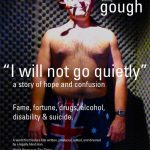
So I thought that if I get a range of experts to discuss the very important topics of disability and mental health and use my own life and experience as a template, that this would go some way to educating folks. As I found in my research, a lot of people who have a disability can go on to battle depression and other types of mental illness, mainly due to the fact they have found themselves the victim of discrimination, which is unacceptable and needs to change. The film was predominately made to reach people without a disability, to educate this group and dispel some of the negative stereotypes associated with disabilities, not just vision impairment.
This is a lot to take on for a first project. How did you manage the technical and emotional challenges of the film?
I was very proud of that film as I wrote, directed, shot, edited, and produced it all myself. Again, hoping to prove my point that even though I am legally blind, this does not mean I can’t create quality, entertaining work.
Exactly! The film is its own testament to the case you were trying to make.
Sure. But there were issues. Shooting it was my biggest challenge and I freely admit the framing of certain shots isn’t first class. But everyone is on the screen, so that’s all that really matters.
Editing the documentary was pretty easy and straight forward, as they were all talking heads, and so therefore I could just pretend I was editing a 90 minute radio commercial.
In regards to equipment, I just used the very basic: a handy-cam to shoot on and editing software which only gave me 8 tracks to play with. But again for, a documentary, you don’t really need a lot of the bells and whistles, which was another key reason in my decision to start my film making journey with this form. Docs may not be “box office” popular, but they are a lot easier and cheaper to make than a stunt-heavy action film.
Also to make things a lot easier for myself, I edited as I went. The process went like this: I’d organize an interview with someone, go out, get the footage, come back and cut out the six or seven (more or less) quotes I thought I’d end up using. The I’d put them aside. When I’d finished all the interviews, it was about placing them in and around the narrative of the story, kind of like putting a jigsaw puzzle together.
Let’s back up a bit. How did you get this documentary project off the ground? Can you discuss the pre-production phase of your work?
Once I had made the decision to make the film, the first thing I needed to do was write up my outline. I needed to be clear on what my overall message was and make sure everything that was going to be a part of the film would contribute to that. I needed to script it and then go about organizing my interview subjects. I also needed to look into equipment. I thought the best thing to do was to just buy what I could afford. The entire film was funded out of my own savings.
Most documentary filmmakers need to do a heap of research before starting a film, but because I lived this story, I didn’t have to do that much. It was more about finding a wide range of interesting people to interview, which I think I did. I managed to get 24 people including psychologists, school teachers, a neurosurgeon and even comedians. After all, I don’t want to depress people, and it’s important to bring a bit of humor to any issue, no matter how controversial it may be.
You’ve gone on to produce numerous comedic shorts. It’s really quite an output! What draws you to comedy as an expressive mode?
Yes, most of my other 12 short films are comedy based. We started off with The Advertising Meeting; it runs for about 25 minutes and takes place in the boardroom of an advertising agency. In the film, executives are trying to develop a strategy for Aunty Beryl’s Burger Hutt—all kinds of personal secrets are revealed, emotions run high; there are outrageous distractions.
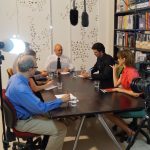
I also completed 7 interview/chat-show style films, where I interview fictional celebrities: Gypsy Diamond (world famous mystic), Robby Pockets (eccentric rock star), Jimmy Poodle (overpaid and oversexed soccer star) among others. Each one runs about 20 minutes.
That’s quite a concept. Sounds hilarious!
Yes, it was a lot of fun creating these characters and revealing the kinds of hypocrisy and ridiculousness that makes up celebrity culture.
As I mentioned, comedy is my favourite genre, so I always lean in this direction when writing and also when going to the cinema to watch a film. There’s nothing better than a bloody good laugh!
I also think comedy can be a powerful weapon because when people are laughing their defenses are down. So you are able to get your message across a lot better as people are more relaxed and open to what you are saying.
Speaking of lending humor to thorny subjects, can you speak about your latest film—the mockumentary, The War on Drugs? What was your goal with this project?
The War on Drugs is all about just that, the “so called” war on drugs. I love getting a subject and ripping it apart from every angle. I make a special point not to play favorites, all players receive their due whack.
Again, for me, it’s all about exposing the hypocrisy of the people involved. For example, a politician may publicly say “drugs are bad, don’t do drugs.” But then on the evening news, you’ll see him getting arrested for dealing or taking drugs. The police may arrest you, but they’ve also been known to sell these products from time to time. On the flip side, a drug dealer may claim he’s a nice guy and that he goes to church every Sunday, but then he’s selling deadly narcotics down the street to school kids. And as for drug users, they can claim that they’re normal, fine and healthy, but when they need a fix, they’ll lie, cheat, and steal to get what they want. I’m not for or against drugs, and that’s not what the film is about. It’s more about showing how real people behave, the contradictions that lurk behind public masks. And also, I’m trying to get a message across: Be who you are; don’t try and hide behind a character-mask because at the end of the day, the real you will always shine through.

The way governments and jurisdictions police drug sales and use is a highly provocative topic, one with very real consequences for vulnerable communities all around the world. It seems you have important but limited intentions with this film. What exactly are you trying to achieve?
All of my work has one major goal and that is to be entertaining, first and foremost. Having said that, I do hope my work provokes thought. But in entertainment, the comedy must take precedence. At the end of the day it’s all about entertaining people and giving them a laugh.
The film borrows heavily from the documentary mode (at the same time as it mocking this form). This allowed me to really sink my teeth into the material and the characters. I think the message I’m trying to get across works best in this form because it’s more of an “interview/sketch” setup. And, as previously mentioned, writing dialogue is where my strength lies, it allows me to play to my strengths and write some witty back and forths.
How have you developed an audience for The War on Drugs? What are your post-production plans?
The War on Drugs is now available to download directly off the Beernuts Productions website. So people can hit up the website and enjoy the film right away.
We have also had some wonderful media coverage for the film, which I’m pleased about. I’m very grateful to publications like The Independent that support the work I do. At the end of the day, the more downloads I get the more films I can make and the more jobs I can provide local actors and crew members. So, I am very grateful for every bit of support my independent production company receives.
What are your plans moving forward, for this film or for other projects?
Thankfully Beernuts Productions is established and here to stay. We are planning a broad range of projects. Next up is another mockumentary, this time about the environment. Should be a lot of fun! So make sure to stay tuned.
Regions: Australia
